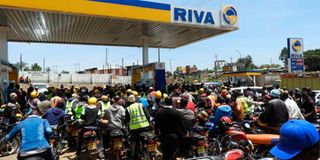Why is there a fuel crisis? Story of subsidies, hoarding and greed

Motorists flock Riva petrol station in Bomet to buy fuel on April 3, 2022. It was the only outlet that had fuel following a shortage, with the crisis persisting for the fifth day running.
What you need to know:
- Epra has vowed to take action against oil firms that are hoarding the product.
- Kenya Pipeline Company has said the country has enough fuel stocks.
Long, winding queues running into the dead of the night are becoming increasingly common in petrol stations across the country as the fuel shortage threatens to spiral into a full-blown crisis.
The Energy and Petroleum Regulatory Authority (Epra) said on Friday that the country has 80,766 cubic metres of petrol — enough to last nine days — and 217,570 cubic metres of diesel, sufficient for 22 days.
The Kenya Pipeline Company (KPC), the state entity charged with ensuring there is steady supply of fuel, on Saturday said the country has enough fuel stocks and that ships are waiting at the dock to offload more supplies.
“KPC would like to confirm that there are ample stocks of petroleum products in our system throughout the country to meet demand,” said KPC Managing Director Macharia Irungu.
In pictures: Fuel crisis hits Kenya
This begs the question: Why have petrol stations run out of fuel? Epra put the blame on the delays in the disbursement of the fuel subsidy cash by the Ministry of Petroleum and the National Treasury.
Since October, the government has kept fuel prices stable by cutting the margins of oil marketing companies (OMCs) despite increasing international prices by reimbursing them through the subsidy scheme.
But in February, global crude oil prices short up sharply following Russia’s invasion of Ukraine, leading to oil supply shortages as Western countries imposed sanctions on Moscow, including a ban on its oil.
Exporting their stock
Russia is the world’s third largest producer of crude oil. This led to a sharp increase in the cost of refined fuel imported into Kenya, forcing the government to increase the price of petrol and diesel by Sh5 per litre on March 14.
Despite the prices increase, the government maintained the margins of oil companies at zero, which means all the fuel they were selling did not generate any money for them.
They have to wait for the government to reimburse them. But the government has been delaying for months to pay the oil firms, which has forced them to hoard fuel, fearing losses, leading to the current crisis.
The Nation understands that the oil firms are owed about Sh13 billion by the state accrued over months of delays.
Due to the cash-crunch, some firms are now exporting their stock to Rwanda, Tanzania, Uganda and the Democratic Republic of Congo (DRC), where they are guaranteed instant cash on sales.
The export of fuel also had a ripple effect on independent petroleum dealers who buy their stock from the OMCs that get their share from KPC through the Open Tender System (OTS).
This means that the small oil dealers — who form a vast network across the country — have no fuel to sell. They also lack the financial muscle to buy any fuel that becomes available due to delays in subsidy cash payment.
Hoarding the product
“The situation has adversely affected the non-franchised [independent] outlets while the franchised ones have witnessed spiked demand,” said Epra.
The crisis has given oil firms the leverage to arm-twist the government into granting their wishes, besides payment of the subsidies, before normal supply is restored.
Petroleum Principal Secretary Andrew Kamau said oil firms want fuel prices reviewed fortnightly, not monthly. The firms want to use the two-week cycle to pass on additional costs to consumers quickly whenever global crude oil prices rise.
“If the prices are reviewed every two weeks, the average price is more accurate during the shorter period and could eventually lead to price stability as opposed to the large increase in prices we are now seeing each month,” a chief executive of an oil firm told the Nation. Mr Kamau dismissed the demands, saying, a two-week pricing cycle is “not feasible”.
“We are not going to change the pricing cycle. The monthly cycle gives certainty about the prices,” he said.
Epra has vowed to take action against oil firms that are hoarding the product. It’s considering cutting the fuel allocation from the OTS to one of the top three OMCs accused of deliberately putting a quota on the fuel it sells locally despite having sufficient stocks.
The firm has limited each customer to buying fuel of up to just Sh1,000 despite being a significant player in the market with large oil stocks. It reportedly prefers to export its fuel for instant profits.





